Navigating the complexities of wholesale B2B eCommerce involves overcoming challenges like limited reach, supply-demand imbalances, and order fulfillment delays. Choosing the right B2B platform is crucial to addressing these issues and driving business growth. For instance, Atwix developed a tailored platform for Byrne Electrical Specialists, significantly improving their order processing and customer satisfaction.
For more information, you can visit the Atwix case study on Byrne Electrical Specialists.
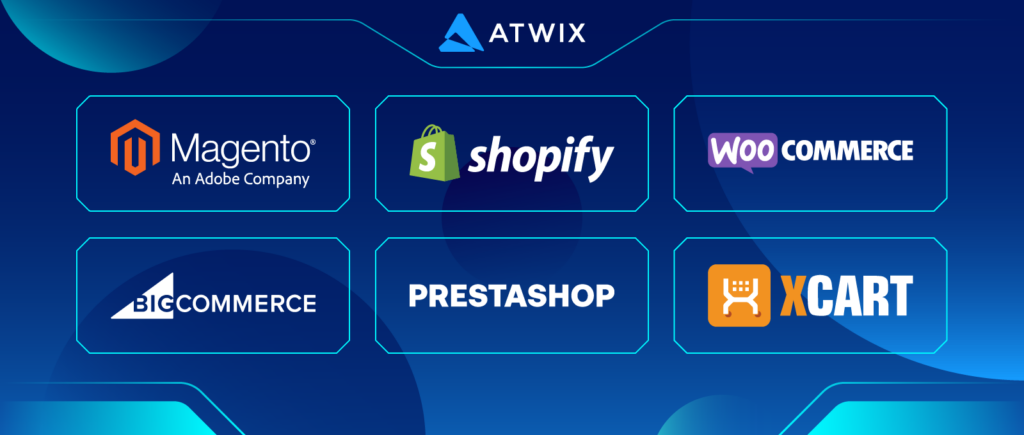
Atwix is a full-service eCommerce agency with deep Adobe Commerce/Magento expertise. With distinctive solutions, Atwix helps our clients deliver outstanding online experiences. We offer full eCommerce services, including auditing, consulting, developing consumer-oriented websites for B2B marketplaces, and ongoing website support.
Our approach to wholesale B2B eCommerce is built on understanding our clients’ unique needs and delivering solutions that truly make a differenceBen Rudnick
VP of Digital transformation at Atwix
This article will cover the essential features and benefits of wholesale B2B eCommerce platforms, explore the different types of wholesalers, and compare B2B eCommerce with retail. We will also review top platforms and share insights from Atwix’s case studies to help you make informed decisions.
Atwix has a proven track record in developing robust B2B eCommerce platforms that solve real-world problems. Our team’s expertise in Adobe Commerce/Magento allows us to deliver customized solutions that improve operational efficiency and customer experiences.
Ready to Optimize Your Wholesale B2B eCommerce Platform?
Partner with Atwix to implement a solution that meets your unique business needs. Contact us today for a personalized consultation.

Features of Wholesale eCommerce Platforms
Wholesale eCommerce is a B2B model where items are sold in bulk and at a discount, effectively acting as an intermediary between the manufacturer and the distributor or retailer. Let’s look at what features such a platform should have.
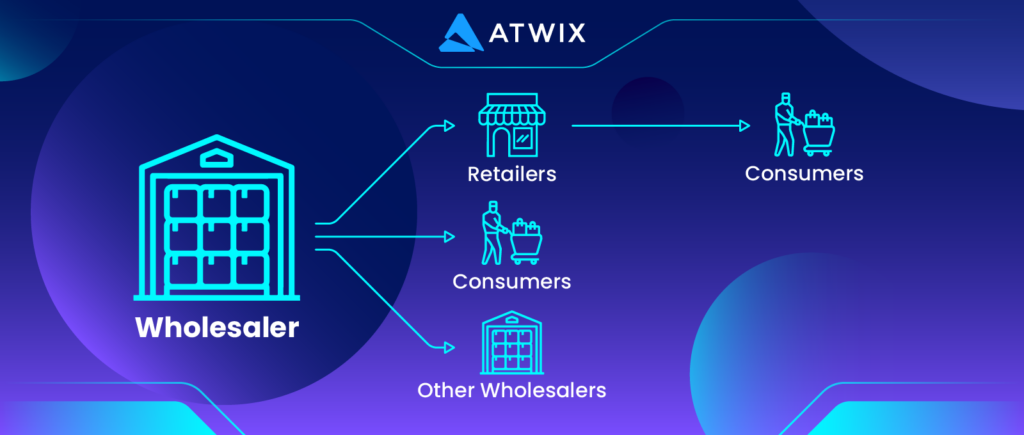
Product Catalogs
A product catalog showcases everything you sell in an online, digital format. It should make your products appealing to a B2B buyer. Include information about the details of your product and the purchasing procedure. An extensive, up-to-date, engaging product catalog is your most valuable asset for running a thriving wholesale business.
Customized product catalogs will enable you to showcase products with your customer’s logo rather than the generic version of the product.
Customer Accounts and Management
Robust and user-friendly customer account pages are essential to any wholesale B2B eCommerce website. They help to record order details and client information, track delivery, control fulfillment, and communicate with your clients. Customer pages help to build trust and long-term relationships with B2B clients. Customer account pages on a B2B eCommerce website should be personalized and have multiple users linked to a single central institution.
Order Management
The order management feature helps you improve your B2B inventory and sales process. It assists with order confirmation, tracking, and price management.
- Order confirmation. Sending automatic confirmations with order numbers, estimated delivery time, and other details to customers after a purchase.
- Order tracking. Fetching shipping data from delivery services to display shipping updates to track the orders.
- Price management. Ensuring that your wholesale eCommerce website shows consistent pricing across all pages and search results.
Order management should be easy to use, so everyone on your team understands how it works. This allows sales representatives to gather information on recurring customers and warehouse managers to monitor inventory levels.
Payment Processing
Payment processing entails the secure exchange of transaction details between clients, merchants, and payment service providers, facilitating the authorization, capture, and settlement of payments. Ranging payment versatility from typical credit cards to Buy Now, Pay Later platforms will add the flexibility B2B clients require from the purchase process.
Shipping and Fulfilment
Wholesalers’ primary focus is on shipping and fulfillment. Wholesale businesses that can integrate and streamline their fulfillment processes achieve more.
Usually, you send companies large, bulk orders. Complex shipments prioritize speed of delivery. If you work with retailers, efficiency takes precedence over client service. You must help them stock up beforehand. To clarify and streamline the fulfillment process, send shipping confirmations to the purchaser and you as a wholesaler.
Reporting and Analytics
Automated reporting and analytics can save time and provide relevant insights with dashboards, reports, scheduled email reports, alarms, and more. Forecasting algorithms automatically tune the demand based on individual customer data, and automated insights uncover the core causes of changes in KPIs.
Efficient reporting and analytics help to improve inventory rotations, delivery accuracy, cross-sell, up-sell, and category performance. Creating a customized dashboard for every salesperson’s account will help you assess their individual performance.
Benefits of Wholesale eCommerce
Buyers can get real-time personalized pricing and make custom quotes thanks to wholesale eCommerce. It also allows businesses to entice clients to buy more significant amounts to benefit both sides.
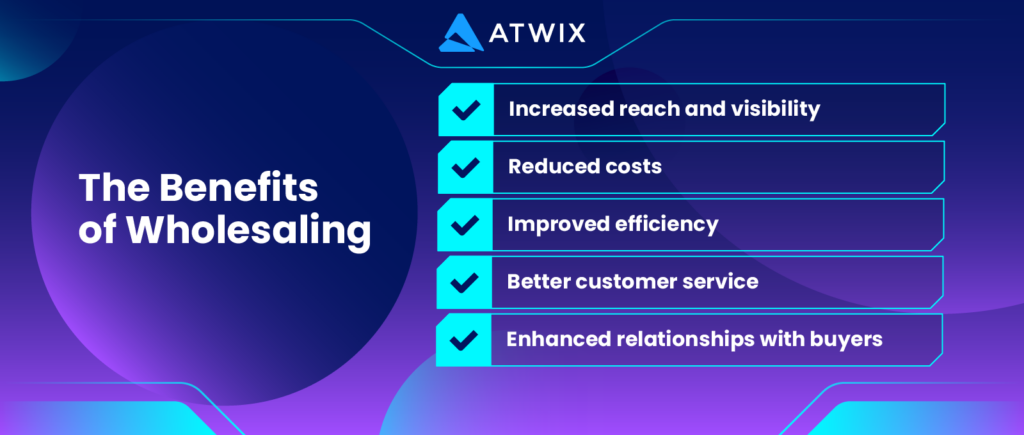
Benefits for Distributors
- Increased Reach and Visibility: Wholesale eCommerce allows distributors to access a global customer base without needing physical storefronts or sales representatives. This broader reach opens up new market opportunities, enhancing overall visibility.
- Reduced Costs: Bulk shipping lowers fulfillment expenses. Additionally, wholesale platforms reduce costs linked to traditional sales models, such as rent, sales staff, and marketing materials, making operations more efficient and profitable.
- Improved Efficiency: eCommerce platforms streamline ordering processes, minimizing the manual effort for managing mass orders. Automation in checkout, billing, and inventory management frees employees to focus on strategic business aspects. Implementing B2B eCommerce for distributors also enhances the supply chain by providing real-time updates and analytics for better decision-making.
Benefits for Customers
- Better Customer Service: Wholesale eCommerce solutions offer features like easy product browsing, order placement, and real-time shipping updates, enhancing the client experience and boosting satisfaction and loyalty.
- Enhanced Relationships with Buyers: Online marketplaces empower B2B buyers to research and purchase on the go. These platforms provide tools to manage wholesale client relationships better, helping businesses understand and meet customer needs effectively.
Accelerate your wholesale business growth with a full-service eCommerce agency.
Types of Wholesale eCommerce Businesses
When starting a B2B eCommerce business, you need to understand the types of wholesalers. Let’s review the most common categories.
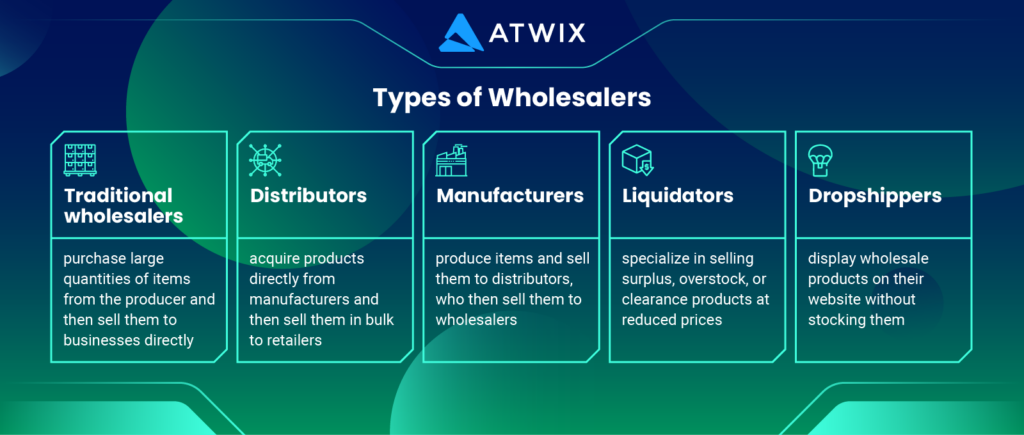
Traditional Wholesalers
Traditional or merchant wholesalers follow the conventional business model. They purchase large quantities of items from the producer and then sell them to businesses directly. These wholesalers often have extensive market history, expertise, and knowledge. Building relationships with merchant wholesalers can benefit eCommerce firms wanting to establish themselves in the wholesale industry. They are often among the most trusted professionals.
Distributors
Distributors are not original manufacturers. They acquire products directly from manufacturers and then sell them in bulk to retailers. eCommerce platforms for distributors cover logistics and customer service, allowing producers to concentrate on manufacturing. They are the ones who put together wholesale arrangements, from estimating product values to selling them. Because of their close relationship with manufacturers, distributors are frequently less trusted than other wholesalers when developing equitable sale plans.
Manufacturers
Manufacturers, distributors, and wholesalers often collaborate in the supply chain to get goods into the hands of retailers. Manufacturers produce items and sell them to distributors, who then sell them to wholesalers. Then, wholesalers sell to retailers, who work with end users. Selling and shipping in bulk helps manufacturers increase product volume and save money on fulfillment while decreasing cost-per-unit and increasing their profit margin. Ecommerce for manufacturers plays a pivotal role in optimizing this supply chain for better efficiency and scalability.
Liquidators
Liquidators and clearance wholesalers specialize in selling surplus, overstock, or clearance products at reduced prices. eCommerce allows them to access a bigger audience and swiftly dispose of excess goods. Liquidators and clearing wholesalers can solve surplus stock issues, build an effective inventory turnover cycle, and connect more directly with clients worldwide by embracing wholesale eCommerce.
Dropshippers
This type of wholesaler is distinct in that they sell things without stocking them. Instead, dropshippers simply display wholesale products on their website. When clients order on their website, the manufacturer ships the product straight to the buyer. Dropshippers develop an online storefront, quickly fulfill orders, and help manufacturers manage the wholesale business.
Wholesale B2B eCommerce vs. Retail
| Criteria | B2B eCommerce | Retail |
| Target Audience | Other businesses (retailers, resellers, etc.) | End consumers (individual users) |
| Order Volume | Large quantities per order | One item or small amounts per order |
| Pricing | Negotiable bulk discounts | Standard retail pricing and occasional promotions |
| Product Assortment | Specialized variety | More diverse range, catering to customers preferences |
| Order Process | More formal. Focused on payment versatility and streamlined delivery | Personalized recommendations and easy checkout |
| Customer Relationship | Focused on long-term B2B relationships | More varied and short-term relationships, including one-time orders |
| Distribution and Logistics | Directly to B2B clients’ stocks or distribution centers | Directly to individual consumers or stores |
| Inventory Management | Frequent collaboration in the supply chain between manufacturers, distributors, and wholesalers | Direct control over inventory levels |
| Technology and Platforms | B2B platforms with multiple integrations | Omni-channel presence, including eCommerce platforms and social media |
Target Audience
Wholesalers sell to other businesses (B2B), which includes manufacturers, distributors, retailers, or other wholesalers. These clients typically acquire things in large quantities to resell them to end users. Retail stores sell directly to customers (B2C). This entails selling things in smaller amounts, and a wide range of products is frequently supplied to meet the various demands of individual consumers.
Order Volume
A wholesale eCommerce company typically accepts only bulk orders. They are frequently willing to sell vast quantities of items at a reduced price, assuming that the more you buy, the lower the cost per unit. Retailers sell things in single units or small numbers, depending on the individual customer’s needs.
Pricing
Because wholesalers buy in large quantities, getting the best price possible is critical to their long-term business. The less they have to pay for each product, the more money they will make in the long run. While pricing is crucial for retail, they have greater freedom because they do not have to buy in quantity. Retailers who sell directly to consumers have higher unit pricing because they must cover the costs of storing, marketing, and selling things.
Product Assortment
Because they sell in bulk, wholesale B2B eCommerce businesses are limited in their product assortment. Manufacturers typically choose a deep assortment strategy, specializing in one or several product categories and catering to the needs of their B2B clients. Retailers have more flexibility in choosing their product assortment strategies. They can have a wide assortment with various product types and categories or a deep assortment tailored to a specific audience.
Order Process
The wholesale order and purchasing process is more formal. Contracts and continuing negotiations are mandatory parts of wholesale transactions. Given the enormous volume and value of items traded, there is a greater emphasis on establishing explicit terms, prices, delivery timetables, and payment terms. Retail purchases are less complicated. Customers choose and pay for what they want online or in a physical store. The emphasis is on speed and convenience.
Customer Relationship
Wholesale eCommerce businesses strive to form long-term ties with their B2B clients. Customer retention is critical because clients often want continual supply. While retailers value reorders, they also deal with one-time or infrequent customer transactions. Retail eCommerce platforms frequently emphasize features such as tailored product suggestions, customer feedback, and simple return processes.
Distribution and Logistics
eCommerce Wholesale distributors connect with retailers to sell those goods at a higher price to make a profit. When retailers place product orders, the wholesale distributor processes the order, verifies stock availability, and prepares the order for dispatch. Retail logistics encompasses all inbound and outbound operations that move ordered items to the end consumer. Warehouse receiving, inventory management, fulfillment, and shipping are stages of retail logistics.
Inventory Management
Wholesale inventory management allows the tracking of historical and current inventory data. This information helps to make accurate projections about future demand and plan procurement accordingly. Retail inventory management ensures that a retailer has the merchandise customers want and has enough products in stock. By controlling inventory, retailers can meet client demand without running out of goods or carrying an excess quantity.
Technology and Platforms
Using wholesale eCommerce technology and platforms, B2B buyers and procurement teams can locate and acquire products in bulk. The features of these solutions suit wholesalers’ needs. They include bulk ordering, tiered pricing, inventory management, and order tracking. Retail eCommerce platforms leverage software technologies to handle merchant buying demands and seller needs. These requirements include product pages, reviews, transactions, order fulfillment, and refunds.
Top 5 Wholesale B2B Platforms
Here’s a review of some of the best eCommerce platforms for wholesalers to help you decide which is best for your company.
Magento/Adobe Commerce
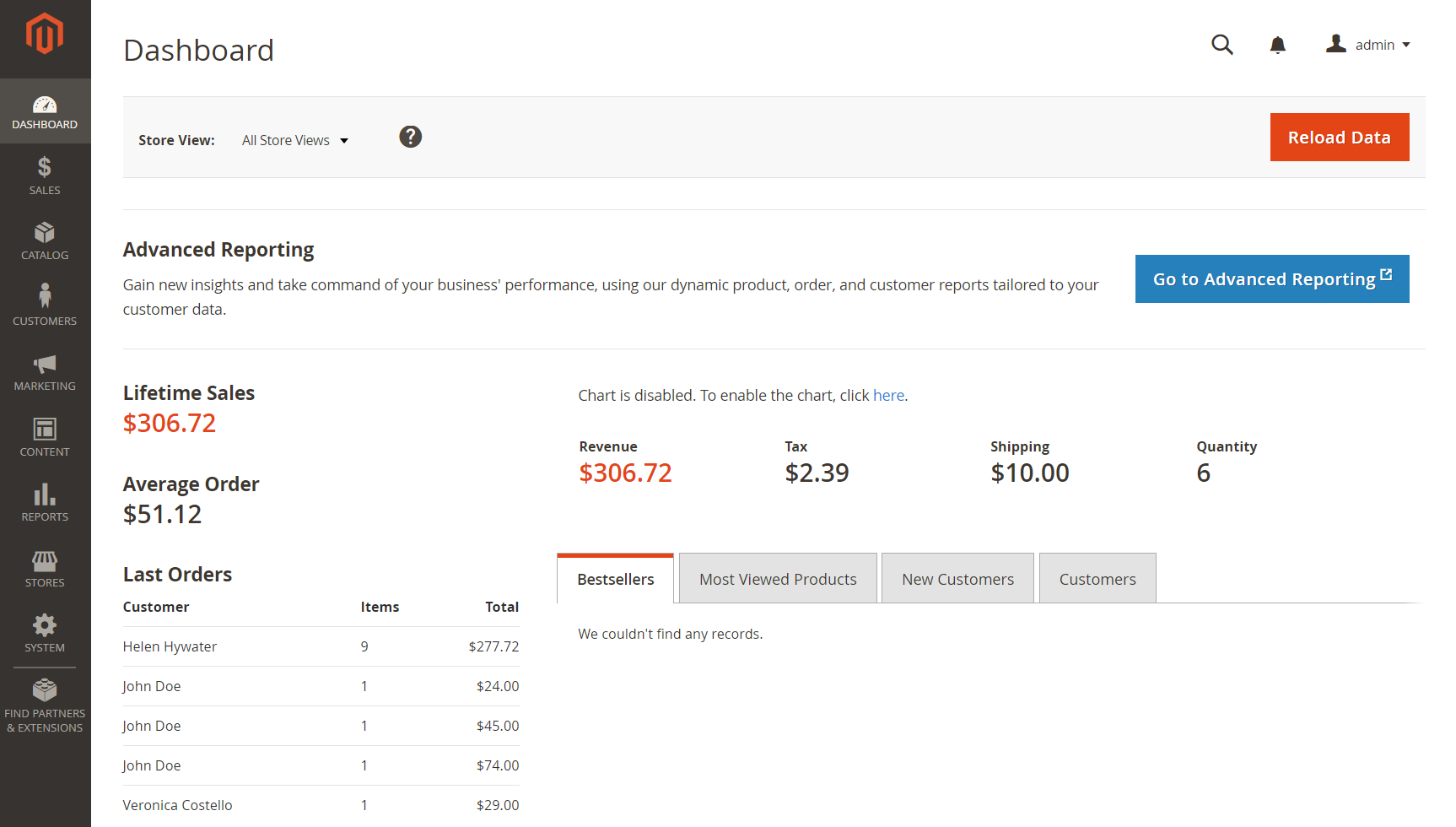
Image Source: docs.magento.com
Adobe Commerce (previously Magento) is a renowned eCommerce platform offering extensive capabilities and flexibility tailored for B2B companies. Its features include a variety of extensions and connectors, making it ideal for wholesale eCommerce. However, wholesalers may need to customize Magento to meet specific performance and functional needs.
Features:
- Robust customization options
- Extensive third-party integrations
- Scalability for large businesses
Considerations:
- High initial setup and customization costs
- Requires technical expertise for maintenance and upgrades
Shopify
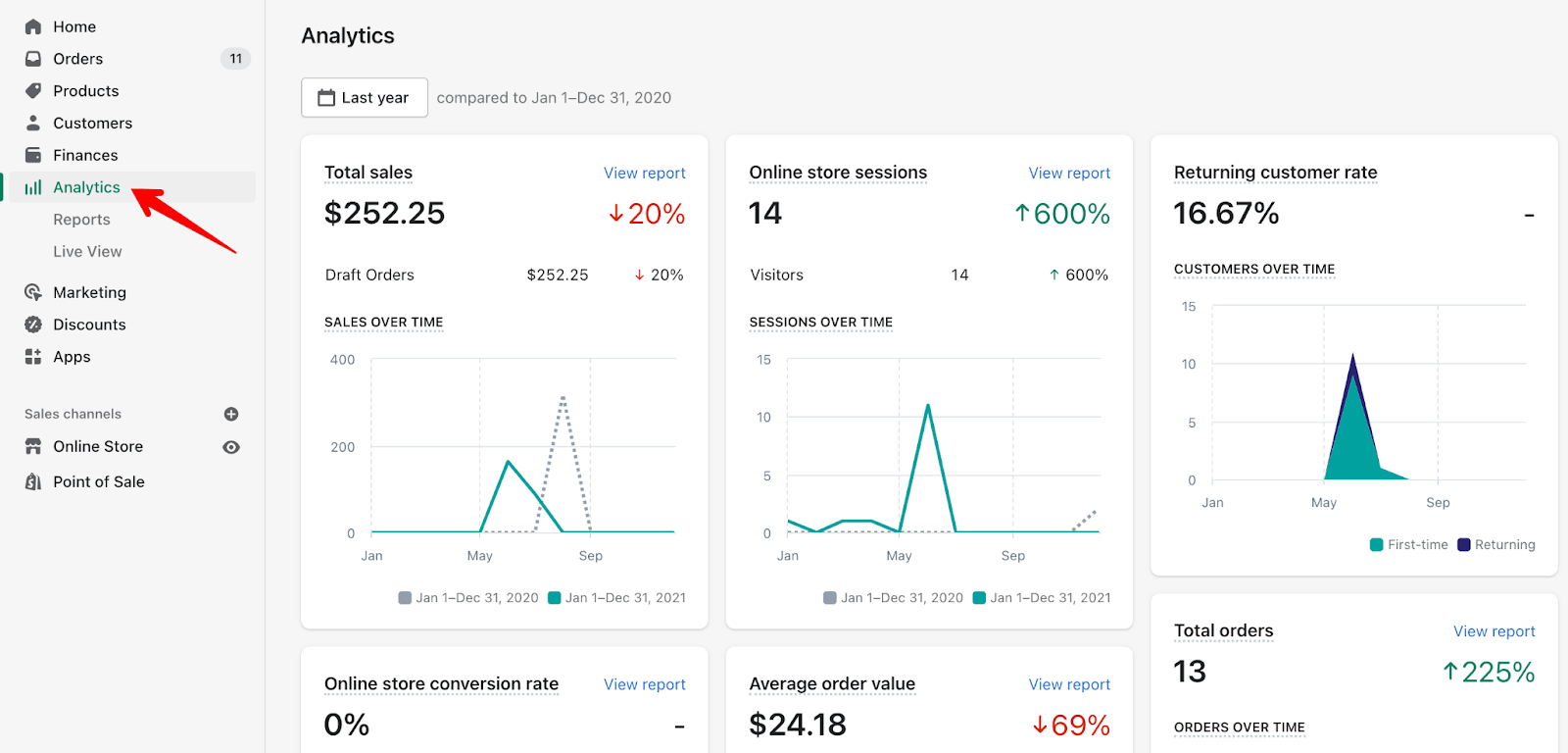
Image Source: coupler.io
Shopify is a widely-used eCommerce platform with growing B2B capabilities, making it attractive for small and medium-sized wholesale enterprises. It offers a range of features and connectors to manage online sales effectively.
Features:
- User-friendly interface
- Extensive app ecosystem
- Seamless integration with other tools
Considerations:
- Limited performance for large-scale wholesalers
- Higher transaction fees compared to other platforms
WooCommerce
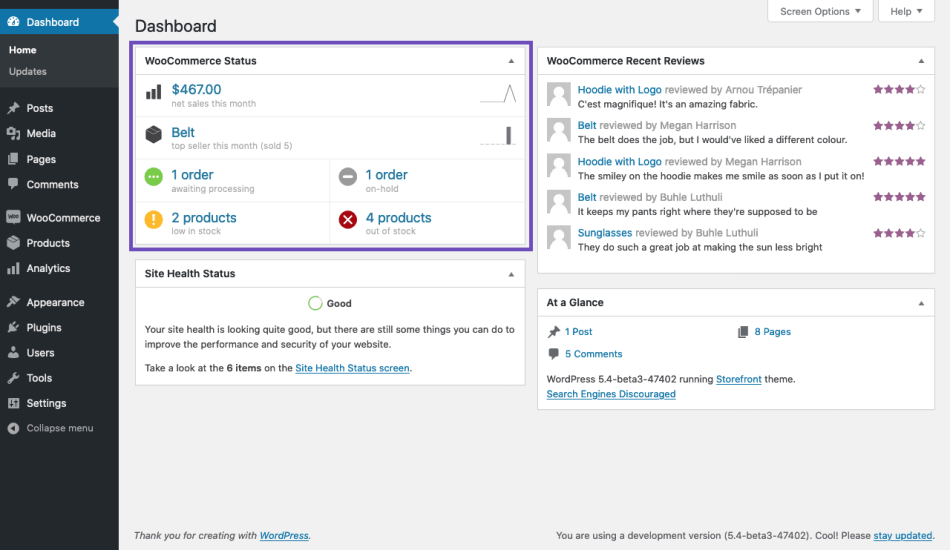
Image Source: woocommerce.com
WooCommerce is a flexible open-source eCommerce platform that integrates with WordPress, allowing extensive customization through various extensions.
Features:
- Highly customizable
- Large community support
- Cost-effective for small businesses
Considerations:
- Requires more setup and development time
- Less out-of-the-box functionality compared to other platforms
PrestaShop
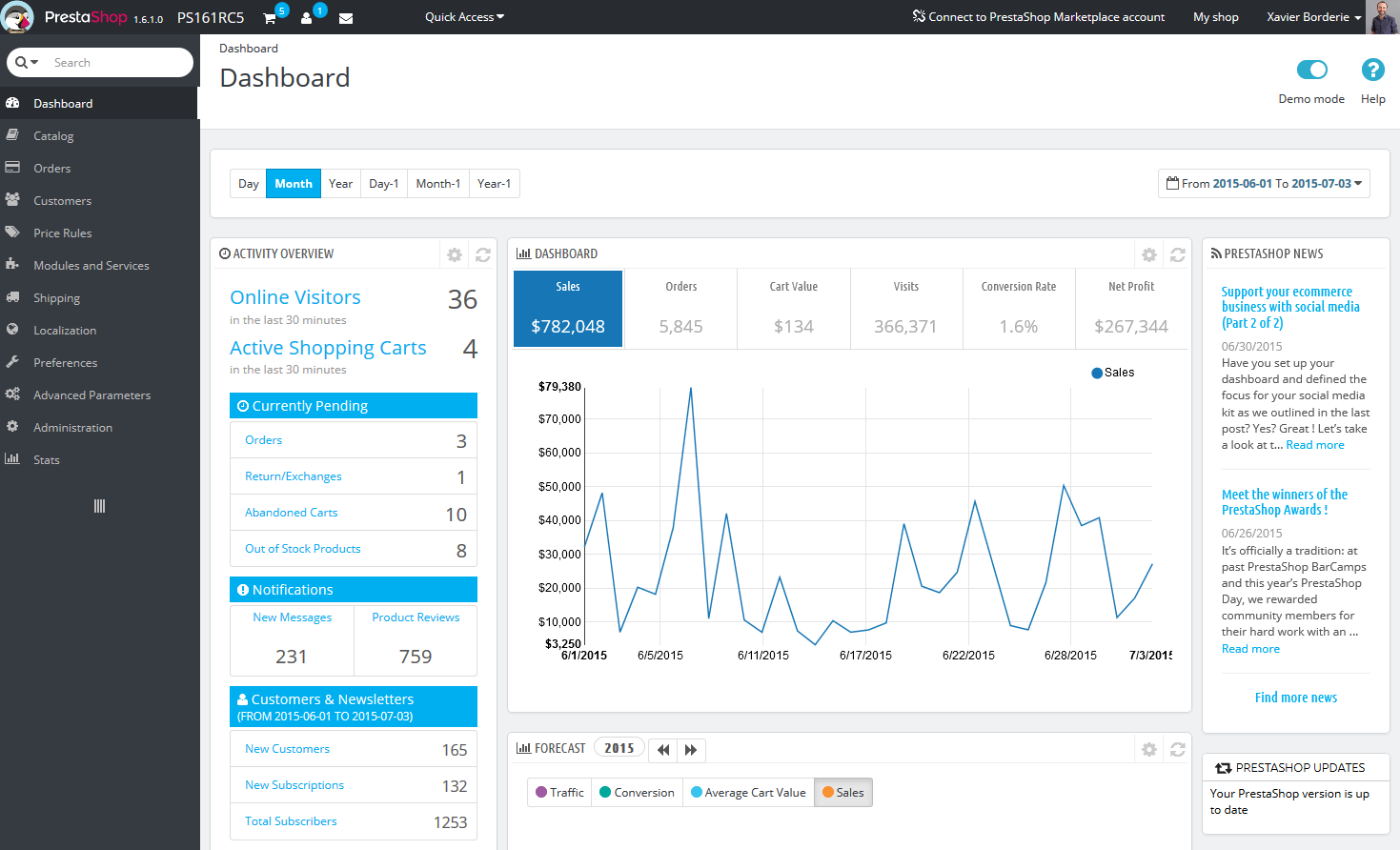
Image Source: Prestashop.com
PrestaShop is a free, open-source eCommerce platform with numerous features for B2B companies. It offers a wide range of integrations and tools for managing operations and customizing designs.
Features:
- Free and open-source
- Extensive customization options
- Strong international community
Considerations:
- May require third-party systems for specific capabilities
- Limited built-in bulk operations features
X-Cart
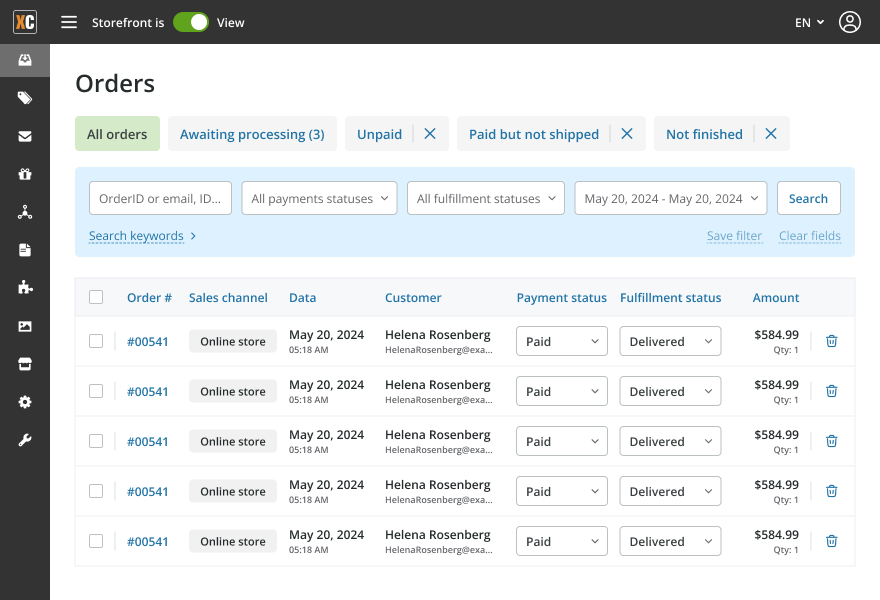
Image source: x-cart.com
X-Cart is a scalable platform with built-in B2B capabilities, including product variants and customizable order workflows.
Features:
- Scalable architecture
- Built-in B2B features
- Localization support
Considerations:
- Requires additional development for complex customizations
- May need to hire external developers for optimal setup
Ready to Optimize Your Wholesale B2B eCommerce Platform?
Partner with Atwix to implement a solution that meets your unique business needs. Contact us today for a personalized consultation.

Things to Consider While Choosing the Best Wholesale Platform
Selecting the right wholesale B2B eCommerce platform is crucial for the success of your business. Here are key factors to consider:
- Budget Compatibility:
• Ensure the platform aligns with your budget, including setup costs, maintenance, and potential upgrades. Evaluate whether the platform offers out-of-the-box integrations that could reduce long-term costs. - Integration Capabilities:
• The platform should support extensive integrations with your existing business systems, such as ERP, CRM, and PIM. Seamless API connectivity is essential for a smooth operational workflow. - SEO and Content Marketing:
• Your platform should offer strong SEO and content marketing tools to enhance visibility and attract B2B buyers. The ability to create optimized, detailed product descriptions and landing pages is vital. - Catalog Browsing and Search Functionality:
• Efficient search functionality, including AI-powered search, is crucial for large product catalogs. Buyers should be able to quickly find what they need using filters and advanced search options. - Payment Flexibility:
• The platform should support versatile payment options, including traditional methods and newer solutions like Buy Now, Pay Later. This flexibility can cater to varying B2B purchasing preferences. - Scalability and Future-Proofing:
• Choose a platform that can grow with your business, offering scalability for increased traffic, orders, and product range. It should be capable of adapting to future market trends and technological advancements.
By considering these factors, you can select a wholesale B2B eCommerce platform that not only meets your current needs but also supports your long-term business growth.
For a detailed comparison and recommendations on the best platforms, feel free to consult with Atwix’s team of experts. We’re here to help you make the right choice for your business.
Atwix Case Studies of Developing B2B Wholesale Platform For Ecommerce
In the Atwix portfolio, we have many successful eCommerce platform development, integration, migration, and customization cases. Our solutions helped our clients overcome the biggest wholesale eCommerce challenges. Let’s review some of them.
A Complete Magento Website Rebuild for Coastal Business Supplies
Our client, Coastal Business Supplies, sells printers, vinyl, and paper for companies. They tasked Atwix with rebuilding their website to emphasize accessibility and friendliness. Atwix completely revamped the site, optimizing code, removing barriers, and fine-tuning the engine, powering the client’s eCommerce operation. As a result, Coastal Business Supplies experienced improved engagement, time on site, user experience, and conversion metrics.
Customizing Magento Webstore for Car Part Kings
Car Part Kings supplies parts for thousands of car models at up to 80% off retail prices. The company recognized the need to increase Magento’s performance by redesigning the search engine and developing seamless interactions with third-party sites. Atwix implemented the Yotpo extension to improve the user experience and build customer trust. We revamped the SEO and improved the checkout process to increase the client’s conversion rate. An upgraded website slashed the average page load time in half while using less memory.
The Bottom Line
Modern wholesale eCommerce platforms allow companies to solve significant challenges. Leveraging robust features, you can increase reach and visibility, balance supply and demand, control order fulfillment, and build long-term relationships with B2B buyers. Configuring and customizing ready-made solutions will help you address your specific business goals in the best possible way. One of the key advantages of B2B eCommerce is the ability to streamline operations, reduce manual processes, and create a seamless buying experience for your customers.
Atwix is a full-service eCommerce agency specializing in Adobe Commerce/Magento. We can audit your wholesale website and turn it into a top-performing, customer-oriented B2B solution. Once we customize your website and improve customer experience, you will be able to pursue strong, long-term relationships with your B2B clients and thrive in wholesale eCommerce.
Contact us for more information about developing the best eCommerce platform for wholesale.
Frequently Asked Questions
Got some questions? We’re here to answer. If you don’t see your question here, drop us a line with out Contact form.
How is Wholesale B2B eCommerce different from B2C eCommerce?
Wholesale B2B eCommerce focuses on selling products in bulk to other businesses, often with negotiated pricing and long-term relationships. In contrast, B2C eCommerce targets individual consumers with single-unit sales, standardized pricing, and a focus on quick, convenient shopping experiences.
What trends are shaping Wholesale B2B eCommerce in 2025?
In 2025, wholesale B2B eCommerce is being shaped by trends like increased personalization, AI-driven analytics, automation, and the growing importance of omnichannel strategies. These trends are driving efficiency, improving customer experiences, and enabling more data-driven decision-making.
How can a business get started with Wholesale B2B eCommerce?
To get started with wholesale B2B eCommerce, a business should choose the right platform, integrate essential systems (ERP, CRM), and develop a scalable strategy. Partnering with an experienced agency like Atwix can streamline the process and ensure success.
How does a wholesale eCommerce platform make it easier to manage bulk orders?
A wholesale eCommerce platform simplifies bulk order management through features like automated order confirmation, real-time inventory tracking, and streamlined fulfillment processes. These tools help reduce manual effort and improve accuracy.
Can I personalize pricing for different clients on a wholesale platform?
Yes, wholesale eCommerce platforms often allow businesses to create personalized pricing for different clients based on their purchasing history, order volume, or negotiated agreements. This flexibility strengthens client relationships and encourages repeat business.
What payment options are available for my B2B customers on these platforms?
B2B platforms typically support various payment methods, including credit cards, bank transfers, purchase orders, and newer options like Buy Now, Pay Later. This versatility caters to the diverse needs of B2B clients.
